Nghe An: Preventing and combating human trafficking in working age
Previously, victims of human trafficking were mainly women and girls in ethnic minority areas and areas with difficult economic conditions. However, recently, the situation of human trafficking in Nghe An has become more complicated; victims of human trafficking include men of working age.
Breaking many lines, arresting many subjects
Most recently in April 2025, the Criminal Police Department (Nghe An Police) successfully broke up a case, arresting two leaders of a fraud ring that sent citizens to work abroad and then sold them to international criminal gangs in the Golden Triangle special zones.

Previously, through professional work, the Criminal Police Department (Nghe An Police) discovered that the group of subjects Bui Thi Thao (born in 1994; hometown in Dien Kim commune, Dien Chau district; residing in Tan Phu district, Ho Chi Minh City) and Le Van Ha (born in 1999; residing in Tam Dinh commune, Anh Son district) had committed human trafficking.
The trick of these subjects is to defraud victims to go to Thailand to work on computers with a salary of 800 USD/month, but in reality, the subjects take the victims to Myanmar to sell to international criminal fraud gangs in the Golden Triangle special zones.
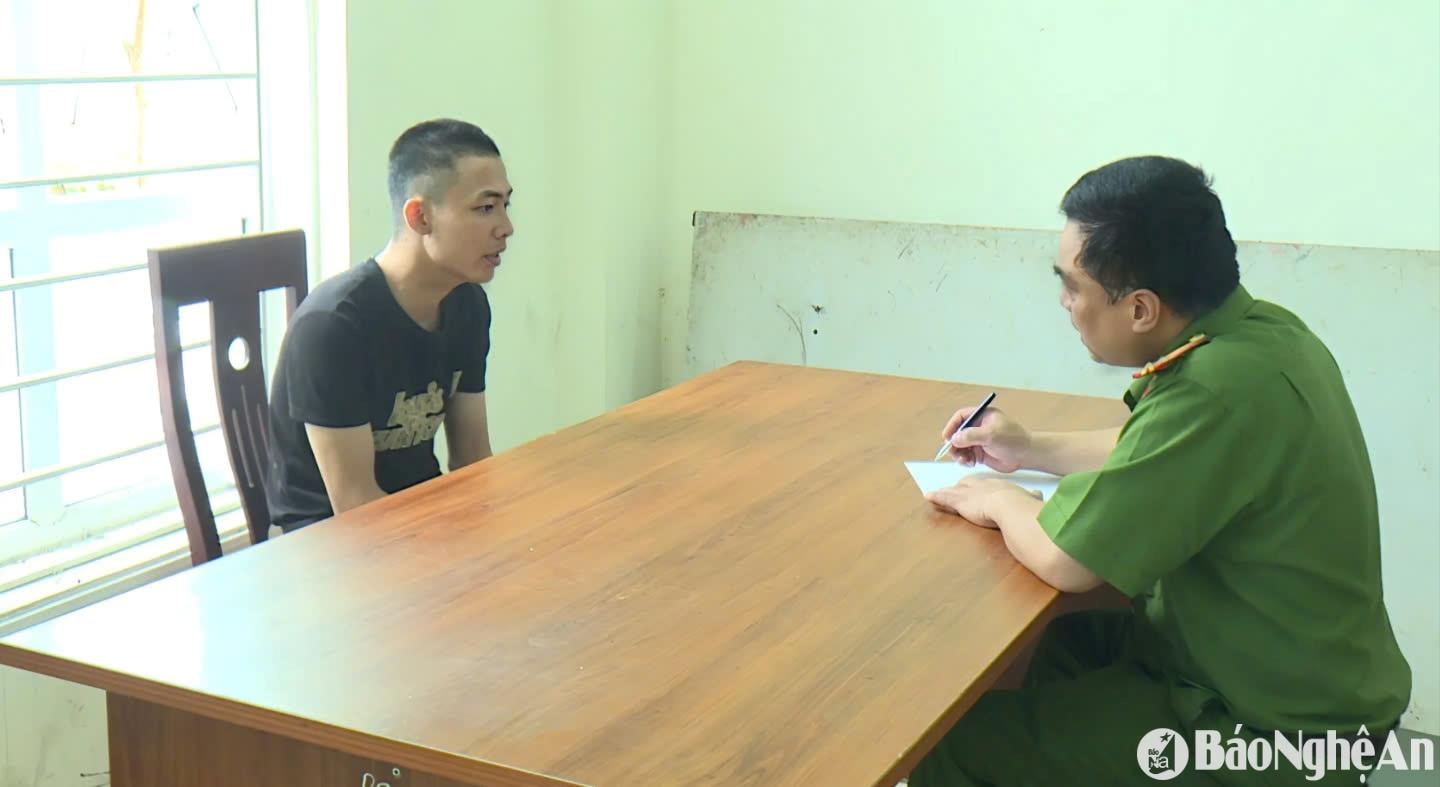
In the autonomous regions of Myanmar, the trafficked people are forced to sign contracts and have their passports confiscated. Each person is provided with a computer, two phones, and an A4 file, and is instructed on how to approach customers and how to scam them. Every day, they have to work from 12 to 17 hours, while they work, they are monitored and supervised, and if they do not work, they will be beaten.
After a period of monitoring and synchronous application of professional measures, on April 1, 2025, the Criminal Police Department presided over and coordinated with relevant units to arrest Le Van Ha when he had just entered Vietnam through Moc Bai - Tay Ninh International Border Gate.
At the same time, another reconnaissance team quickly arrested Nguyen Thi Thao while she was hiding in an apartment building in Thuan An city, Binh Duong province.
At the Investigation Police Agency, Nghe An Province Police, at first the subjects were evasive and denied their crimes, but with the collected evidence, Le Van Ha and Nguyen Thi Thao had to bow their heads and admit their crimes.

Initially, the Criminal Police Department determined that Le Van Ha and Nguyen Thi Thao committed human trafficking against 6 victims. The Investigation Police Department of Nghe An Province has issued a decision to prosecute the case and prosecute Le Van Ha and Nguyen Thi Thao for committing the crime of "Human trafficking" as prescribed in Clause 3, Article 150 of the Penal Code. Currently, the Criminal Police Department is expanding the project, preparing documents to strictly handle the subjects according to regulations.
Previously, in 2024, the police discovered that Vi Van Nhap (born in 1983), residing in Chau Binh commune (Quy Chau), regularly searched for citizens in mountainous districts to send them abroad to work illegally.
During the surveillance process, the police identified Nhap as an important "gangster" in the human trafficking ring to the Golden Triangle economic zones for illegal work, led by Pham Thi Tuyet Chinh (born 1988), residing in Giao Tien commune, Giao Thuy district, Nam Dinh province.
Because she lived across the border and got married at a young age, Chinh knew many "bosses" who needed to find workers to send to work in economic zones to serve transnational fraud activities.
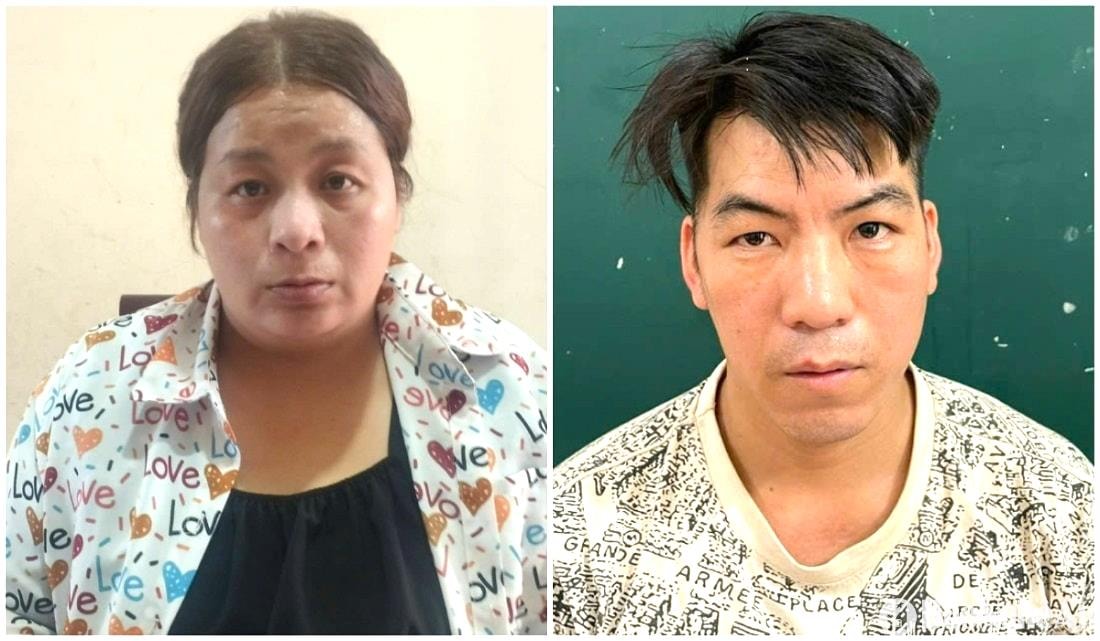
Therefore, this subject has connected with subjects living in many provinces and cities across the country to find and lure gullible people, then sell them to special economic zones in border areas. Chinh even returned to the country many times and went to provinces and cities to find "prey".
During the process of setting up the project, the police force received a complaint from a man who was a victim of a ring that Vi Van Nhap and Pham Thi Tuyet Chinh tricked and sold across the border. In the process of escaping and finding a way back to the country, this man had to use a foam raft to swim for more than 8 days and nights along the Mekong River, begging for food and sleeping temporarily at people's huts along the river. Afterwards, he was fortunately helped by Vietnamese people doing business in Laos to return to Vietnam.
On August 7, 2024, the authorities received information that Pham Thi Tuyet Chinh had just returned to Vietnam by road through Lao Cai International Border Gate. Immediately, a working group moved from Nghe An to Lao Cai to coordinate with relevant units to arrest Pham Thi Tuyet Chinh at 4:00 p.m. on August 8, 2024 in Bat Xat town (Bat Xat district) for the act of "Human trafficking". At the same time, in Quy Chau district, another working group also successfully arrested Vi Van Nhap for similar acts.
According to the Ministry of Public Security, in addition to the trick of luring "easy work with high salary" to bring many men across the border, especially in the Golden Triangle area, to force labor and extort property. Some subjects also take advantage of the economic difficulties and dependence of the victims (borrowing money, not being able to pay debts) to control and force the victims to go abroad to work to pay off debts, at the same time, contact "agents" abroad in charge of finding and leading people from Vietnam to be a source of labor for online fraud centers.
These subjects often organize to take victims to illegally exit the country through trails and openings in border areas and sell them to work abroad illegally for illegal profits.
Diversify propaganda work
Faced with the complicated situation of human trafficking crimes, on November 28, 2024, the 15th National Assembly passed the amended Law on Prevention and Control of Human Trafficking, which added the concept of human trafficking and prohibited acts, ensuring compliance with international treaties, consistency with the domestic legal system, and meeting the requirements of human trafficking prevention and control in the new situation.
.jpg)
On that basis, on March 14, 2025, the People's Committee of Nghe An province issued Plan No. 169/KH-UBNDimplementing the Law on Prevention and Combat of Human Trafficking in the province. In particular, the Provincial Police Department is assigned to preside over and coordinate the implementation of propaganda and dissemination of laws on prevention and combat of human trafficking in the fields of departments and branches. The Provincial People's Committee also requests agencies, units, People's Committees at all levels; the Provincial Fatherland Front Committee and socio-political organizations at the provincial level to proactively select the form and content of propaganda on the Law on Prevention and Combat of Human Trafficking and documents guiding its implementation to ensure suitability with the characteristics and situation.
Accordingly, the target of propaganda to prevent and combat human trafficking is currently not only focused on women and children but also on working-age men, especially young workers in economically disadvantaged areas with high job demands.
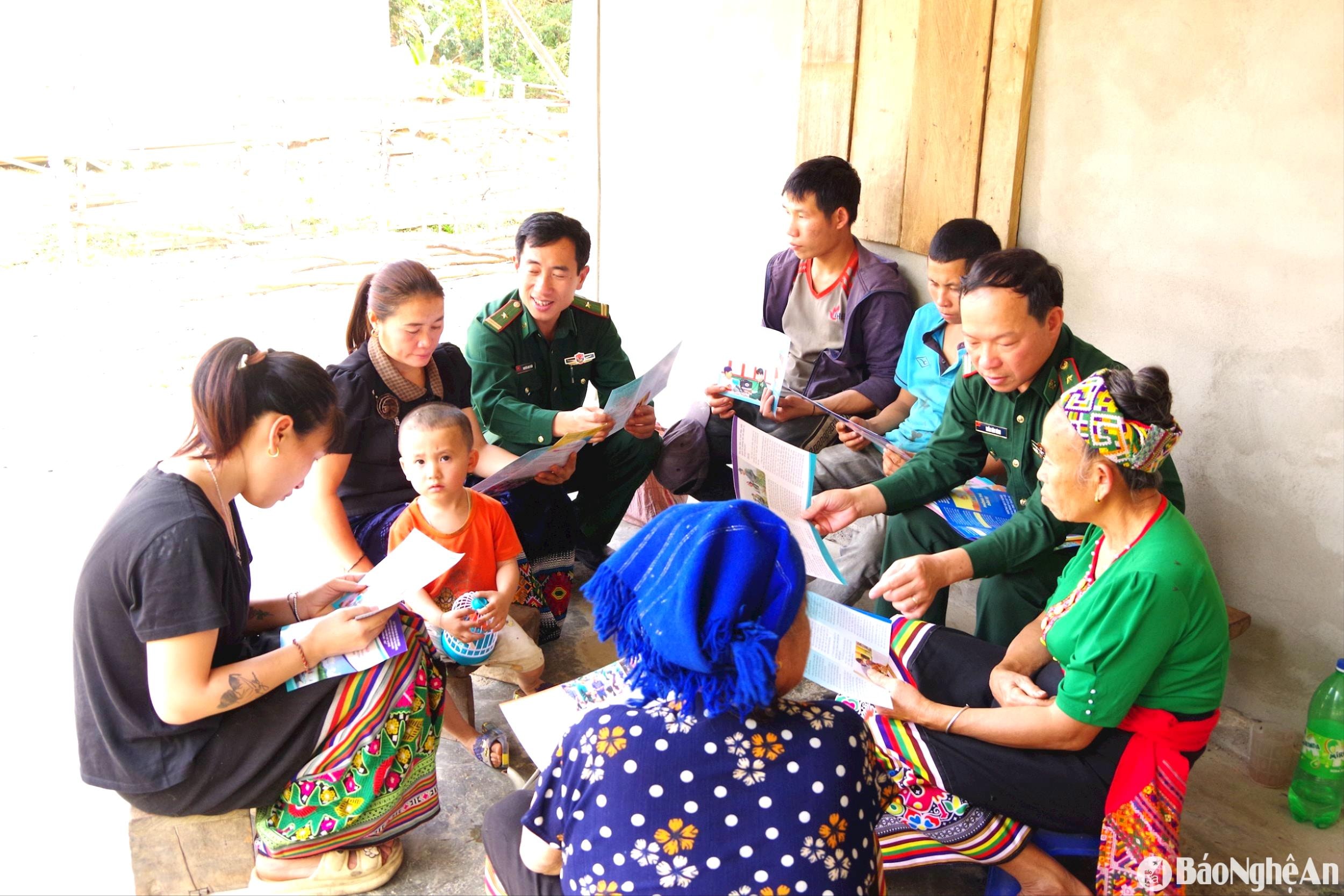
Therefore, it is necessary to focus on researching the application of social networks to propagate the methods and tricks of human trafficking criminals; and the work of protecting and supporting victims.
In particular, recently, Nghe An has been strengthening the organization of communication activities to prevent and combat human trafficking in educational institutions; including propaganda content to prevent and combat human trafficking in civic education programs, extracurricular education of all levels and fields of study, especially in remote areas, communes, ethnic boarding schools, and vocational training institutions. A typical example is the model of coordination in propaganda, dissemination, and legal education for 9th grade students at secondary schools in border and coastal communes of Nghe An province between the Provincial Border Guard Command and the Department of Education and Training.
In addition, for people in remote areas with limited knowledge and awareness, propaganda materials are compiled in bilingual, presented vividly, easy to understand, with practical content... to help people, especially young workers, identify the tricks that human traffickers often use.
Secretary of the Pha Mut village Party Cell, Nhon Mai commune (Tuong Duong) - Mr. Xong Ca Denh shared: "In addition to disseminating the law in many forms; the Party Committee, the government and the Border Guard also guide people to effectively use the "Crime Denunciation Mailbox" - a creative model to help people promote vigilance in protecting security and order in border areas".
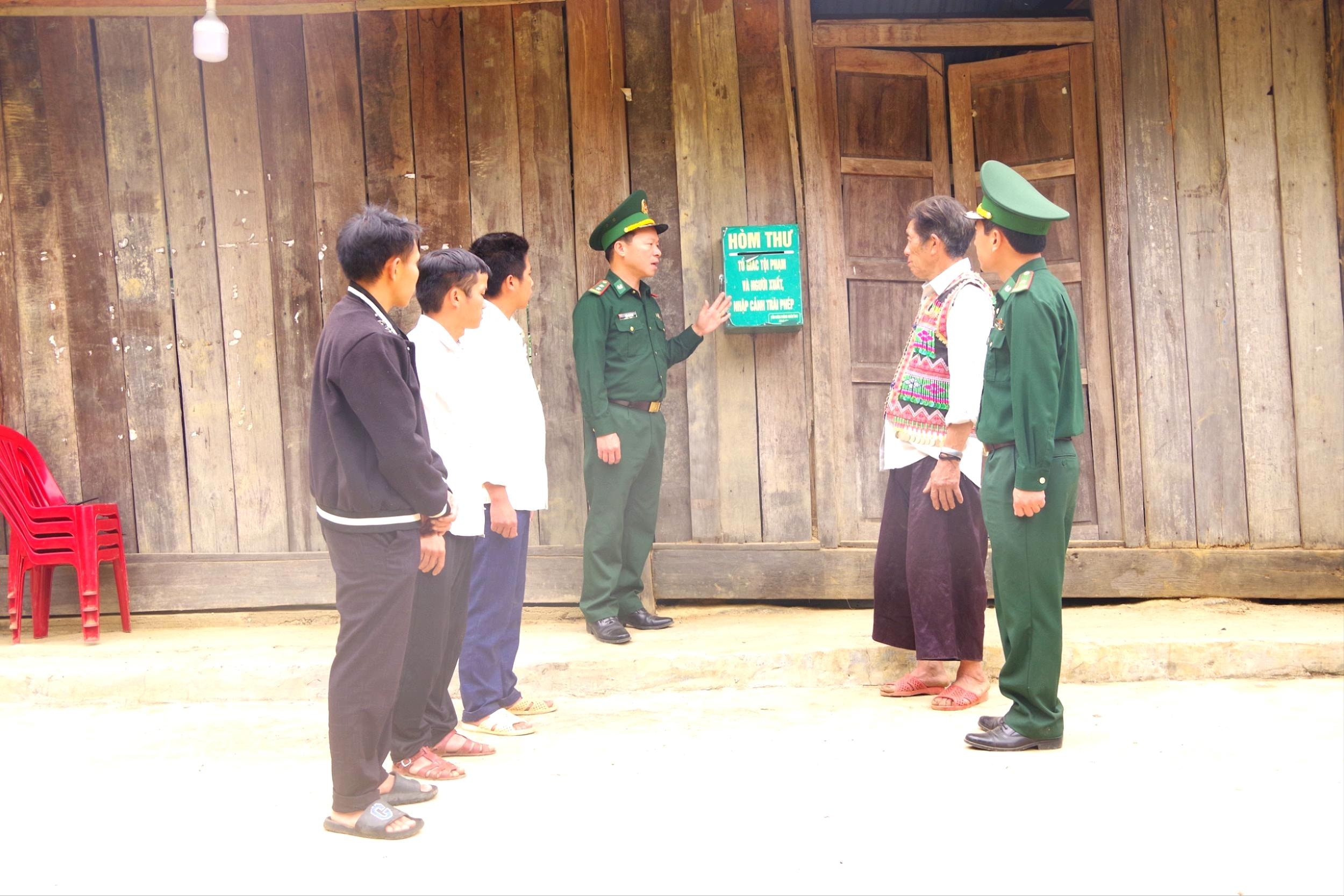
Along with propaganda work, Party committees and authorities at all levels have been paying attention to integrating the content of preventing human trafficking crimes into solving social security and people's safety issues (such as supporting employment, increasing income, eliminating hunger, reducing poverty, etc.).
The functional forces in the province also tightened the management of the area, population management, checking temporary and residential registration, checking service businesses such as hotels, motels, households, complex residential areas, labor centers, industrial parks, job introduction centers, etc. to promptly detect and prevent and handle acts related to human trafficking.
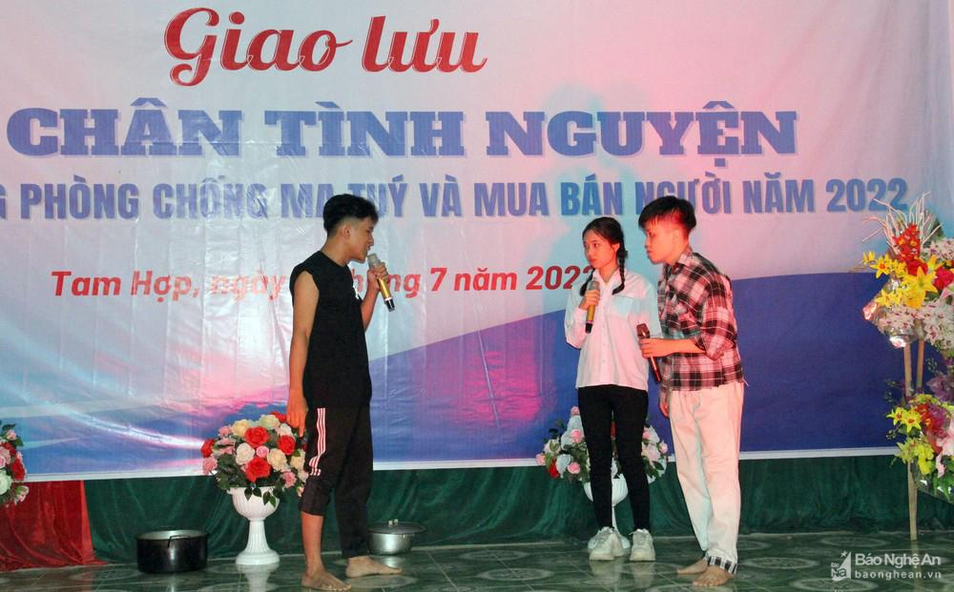
However, in addition to the involvement of authorities at all levels and functional sectors, each citizen needs to raise their vigilance, especially not to believe in invitations of "easy work, high salary" to avoid "falling into the trap" of scammers.
